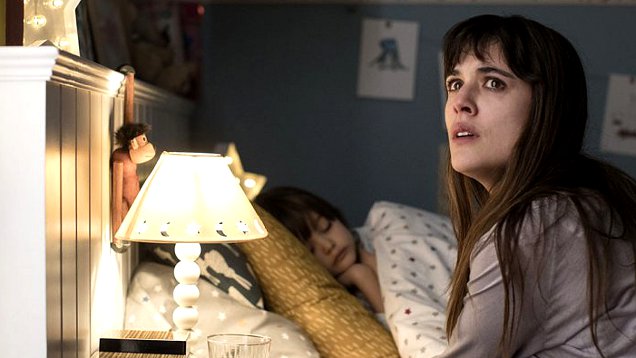Netflix’s mind-bending thriller Mirage is a time travel movie with a difference

Murder, time travel, alternate realities and one great big friggin storm are the key elements in Netflix’s original film Mirage, which is now available to stream. It’s a mind-bending thriller that explores the relationship between weather and anxiety, says Luke Buckmaster.
An electrical storm ruptures the space/time continuum in Netflix’s mind-bending Spanish thriller Mirage, which is styled by director Oriol Paulo so that the film’s aesthetic reflects inclement weather. Storms have irresistibly cinematic qualities, in the rich atmosphere they evoke as well as their potential storytelling significance, such as marking the transition from one state of reality to another – the most famous example being The Wizard of Oz, when a tornado transports Dorothy to the titular location and marks the morphing of the film from monochrome into colour.
Mirage also, like Jeff Nichols’ riveting 2011 thriller Take Shelter, connects meteorologic conditions with intense anxiety. Paulo’s script, co-written by Lara Sendim, takes a Twilight Zone-esqe approach, making it clear it is the world rather than the character that has gone mad. The core thrust of the story involves efforts made by Vera (Adriana Ugarte) to restore a universe that has created a new, parallel world where important elements of her existence have been eradicated.
The film (known in its home country as Durante la tormenta) begins in 1989, at the time of the fall of the Berlin Wall, with a young boy Nico (Julio Bohigas) using a camcorder to record himself noodling on the guitar as an electrical storm brews outside. After witnessing a murder committed by one of his neighbours, Nico flees the crime scene and is struck down by a truck and killed. Twenty five years later, in the same neighbourhood, one local remarks from beneath a skyline choked with ominous grey clouds that the same storm from all those years ago has returned. It’s as if the weather can take the form of an unwanted visitor riding – or roaring – back into town.

Vera discovers she can communicate with Nico by using her television – a ridiculous idea, of course, but the film’s classy production values and gluggy ambience distracts viewers from thinking too much about it. Vera saves the boy from dying, but by doing so unwittingly creates an alternate reality where her husband David (Alvaro Morte) doesn’t recognise her and her baby daughter Gloria (Luna Fulgencio) doesn’t exist, summoning a kind of personal, emotional apocalypse. The $64,000 question becomes what if anything she can do to restore the world back to its original, factory settings.
As the distraught protagonist navigates from one scenario to the next the storm is never far away. Or perhaps a better way of looking at it is that the external world is a manifestation of her inner turmoil and vice versa. There is a violent sense of disruption in this universe, as if a vengeful god has picked it up and shaken it around like a snow globe. Paulo can’t resist dabbling in hacky techniques, such as the well-worn connection scary movies make between physical touch and montage, the connection of hands triggering a whooshing sound effect followed by a series of rapid hallucinogenic images.
In one scene Vera is confronted by a doctor who suggests her memories are false and that her mind ”has drawn a circle.” That same idea might apply to the filmmaker, given following Paulo’s circuitous story feels more like going sideways, or spiralling backwards, then progressing in a forward trajectory.
Some of Mirage’s plot tangents are cleverly conceived and resolved. However the overarching and at times overwrought architecture prioritises storytelling sleight of hand over emotional engagement. The protagonist’s experiences are devastating for her but just another part of the puzzle for the audience. It’s odd how limited our sense of empathy is for Vera, given the loss she is confronted with and Adriana Ugarte’s thoroughly convincingly panic-struck performance. Around her, always, is the intensely interesting feeling – not dissimilar to the raging energy of the underrated action movie Hurricane Heist – that a storm is just about to start, or just about to end.
















